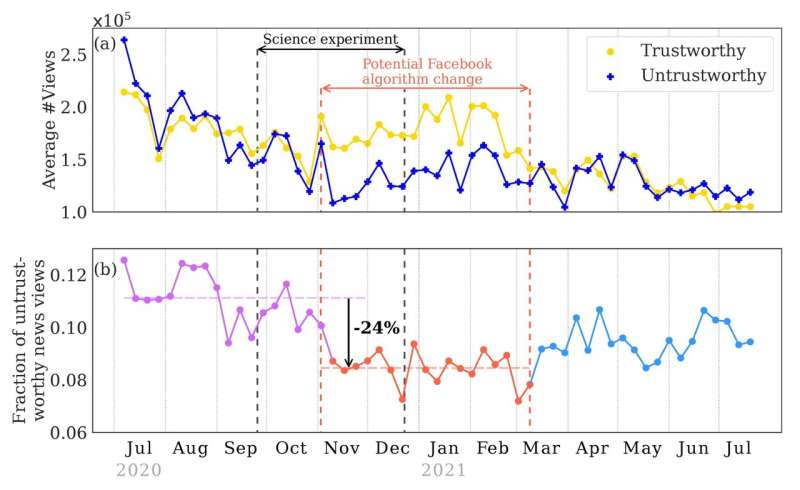An interdisciplinary team of researchers led by the University of Massachusetts Amherst have published work in the journal Science calling into question the conclusions of a widely reported study—published in Science in 2023—finding the social platform’s algorithms successfully filtered out untrustworthy news surrounding the 2020 election and were not major drivers of misinformation.
The UMass Amherst-led team’s work shows that the research was conducted during a short period when Meta temporarily introduced a new, more rigorous news algorithm rather than its standard one, and that the previous researchers did not account for the algorithmic change. This helped to create the misperception, widely reported by the media, that Facebook and Instagram’s news feeds are largely reliable sources of trustworthy news.
“The first thing that rang alarm bells for us” says lead author Chhandak Bagchi, a graduate student in the Manning College of Information and Computer Science at UMass Amherst, “was when we realized that the previous researchers,” Guess and colleagues, “conducted a randomized control experiment during the same time that Facebook had made a systemic, short-term change to their news algorithm.”
Beginning around the start of November 2020, Meta introduced 63 “break glass” changes to Facebook’s news feed which were expressly designed to diminish the visibility of untrustworthy news surrounding the 2020 U.S. presidential election. These changes were successful.
“We applaud Facebook for implementing the more stringent news feed algorithm,” says Przemek Grabowicz, the paper’s senior author, who recently joined University College Dublin but conducted this research at UMass Amherst’s Manning College of Information and Computer Science.
Chhandak, Grabowicz and their co-authors point out that the newer algorithm cut user views of misinformation by at least 24%. However, the changes were temporary, and the news algorithm reverted to its previous practice of promoting a higher fraction of untrustworthy news in March 2021.
Guess’ study ran from September 24 through December 23, and so substantially overlapped with the short window when Facebook’s news was determined by the more stringent algorithm—but the paper did not clarify that their data captured an exceptional moment for the social media platform.
“Their paper gives the impression that the standard Facebook algorithm is good at stopping misinformation,” says Grabowicz, “which is questionable.”
Part of the problem, as Chhandak, Grabowicz, and their co-authors write, is that experiments, such as the one run by Guess and team, have to be “preregistered”—which means that Meta could have known well ahead of time what the researchers would be looking for. And yet, social media are not required to make any public notification of significant changes to their algorithms.
“This can lead to situations where social media companies could conceivably change their algorithms to improve their public image if they know they are being studied,” write the authors.
Though Meta funded and supplied 12 co-authors for Guess’ study, they write that “Meta did not have the right to prepublication approval.”
“Our results show that social media companies can mitigate the spread of misinformation by modifying their algorithms but may not have financial incentives to do so,” says Paik. “A key question is whether the harms of misinformation—to individuals, the public and democracy—should be more central in their business decisions.”
More information:
H. Holden Thorp, Context matters in social media, Science (2024). DOI: 10.1126/science.adt2983. www.science.org/doi/10.1126/science.adt2983
Provided by
University of Massachusetts Amherst
Citation:
Team debunks research showing Facebook’s news-feed algorithm curbs election misinformation (2024, September 26)
retrieved 26 September 2024
from https://phys.org/news/2024-09-team-debunks-facebook-news-algorithm.html
This document is subject to copyright. Apart from any fair dealing for the purpose of private study or research, no
part may be reproduced without the written permission. The content is provided for information purposes only.

